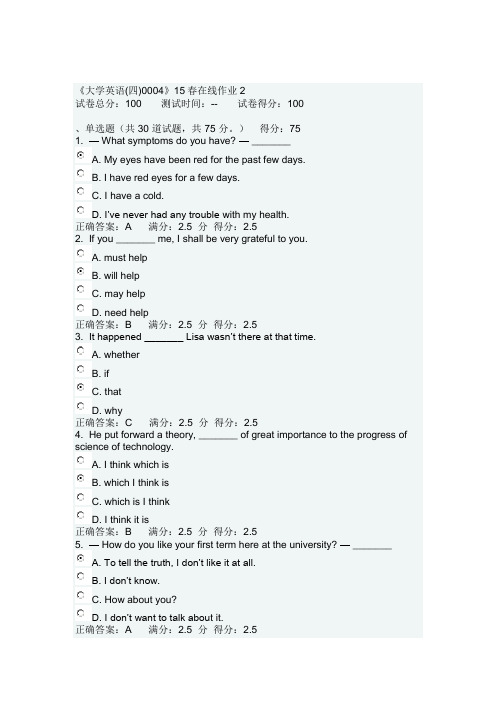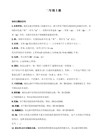What symptoms
- 格式:doc
- 大小:38.00 KB
- 文档页数:1


医学英语会话医生篇一、Asking about Symptoms(询问症状)1. Word: Ache- English Explanation: A continuous dull pain.- Phrase: Headache, toothache.- Usage: “I often get an ache in my lower back after sitting for a long time.”- Bilingual Example: “Do yo u have any aches? For example, a headache or a stomachache? I need to know what's wrong with you.”2. Word: Nausea- English Explanation: A feeling of sickness with an inclination to vomit.- Phrase: Nausea and vomiting.- Usage: “Sheplained of nausea this morning.”- Bilingual Example: “You look a bit pale. Are you feeling nausea? It could be a sign of many things.”3. Word: Fatigue- English Explanation: Extreme tiredness resulting from mental or physical exertion or illness.- Phrase: Chronic fatigue.- Usage: “Fatigue is amon symptom among patients with certain diseases.”- Bilingual Example: “You seem so tired all the time. Is it just normal fatigue or something more serious? I'm worried about you.”4. Word: Dizziness- English Explanation: A feeling of faintness, unsteadiness, and wooziness.- Phrase: Sudden dizziness.- Usage: “He experienced dizziness when he stood up too quickly.”- Bilingual Example: “Hey, you said you felt funny. Was it dizziness? That can be really concerning.”5. Word: Rash- English Explanation: An area of reddened, inflamed skin.- Phrase: Skin rash.- Usage: “A rash on the body can be caused by various factors.”- Bilingual Example: “I noticed you have a rash o n your arm. What do you think might have caused it? It's important we figure this out.”二、Diagnosing(诊断)6. Word: Diagnosis- English Explanation: The identification of the nature of an illness or other problem by examination of the symptoms.- Phrase: Accurate diagnosis.- Usage: “The doctor's diagnosis was based on a series of tests.”- Bilingual Example: “I've done all these tests, and my diagnosis is that you might have a mild infection. It's not too bad, but we need to treat it.”7. Word: Symptom- English Explanation: A physical or mental feature which is regarded as indicating a condition of disease.- Phrase: Key symptoms.- Usage: “We need to look at all your symptoms to make a proper diagnosis.”- Bilingual Example: “These symptoms you have are like pieces of a puzzle. We have to put them together to figure out what's wrong. Do you understand?”8. Word: Disorder- English Explanation: An illness that disrupts normal physical or mental functions.- Phrase: Mental disorder.- Usage: “There are many different types of disorders that can affec t a person.”- Bilingual Example: “I'm afraid you might be showing signs of a certain disorder. But don't worry, there are treatments available.”9. Word: Illness- English Explanation: A disease or period of sickness affecting the body or mind.- Phrase: Chronic illness.- Usage: “Living with a chronic illness can be very challenging.”- Bilingual Example: “Your symptoms suggest an illness. But we need more information. How long have you been feeling like this? It's crucial for me to k now.”10. Word: Disease- English Explanation: A disorder of structure or function in a human, animal, or plant, especially one that produces specific signsor symptoms or that affects a specific location and is not simply a direct result of physical injury.- Phrase: Infectious disease.- Usage: “Preventing infectious diseases is very important in public health.”- Bilingual Example: “I suspect you mig ht have a disease.Don't be scared. We'll do more tests to confirm it. Have you been arou nd anyone who was sick lately?”三、Treatment(治疗)11. Word: Treatment- English Explanation: The use of medical methods to try to cure an illness or injury.- Phrase: Medical treatment.- Usage: “The patient is receiving treatment for his heart condition.”- Bilingual Exam ple: “I think the best treatment for you right now is some rest and taking these medications. You'll be okay, trust me.”12. Word: Therapy- English Explanation: Treatment intended to relieve or heal a disorder.- Phrase: Physical therapy.- U sage: “After the accident, he needed physical therapy to regain his mobility.”- Bilingual Example: “We might need to consider therapy for your problem. It could be like a magic wand to make you feel better.”13. Word: Medication- English Explanation: A drug or other form of medicine that is used to treat or prevent illness.- Phrase: Prescription medication.- Usage: “Always follow the doctor's instructions when taking prescription medications.”- Bilingual Example: “I'm going to pres cribe some medication for you. Take it as directed. It's like little soldiers fighting the bad stuff in your body.”14. Word: Cure- English Explanation: A substance or treatment that can end a disease or medical condition.- Phrase: Potential cure.- Usage: “Scientists are constantly searching for a cure for cancer.”- Bilingual Example: “We hope this treatment will be a cure for your ailment. Wouldn't that be great? Just imagine being healthy again.”15. Word: Procedure- English Explanation: A medical operation or treatment.- Phrase: Surgical procedure.- Usage: “The surgical procedure was veryplex but successful.”- Bilingual Example: “We might have to consider a procedure to fix your problem. Are you okay with that? It's a big step, but it could solve everything.”四、Patient Care(病人护理)16. Word: Care- English Explanation: The provision of what is necessary for the health, welfare, maintenance, and protection of someone or something.- Phrase: Patient care.- Usage: “Good patient care is the key to a speedy recovery.”- Bilingual Example: “I want you to know that you'll get the best care here. We'll take care of you like you're family. How does that make you feel?”17. Word: Recovery- English Explanation: The process of bing well again after an illness or injury.- Phrase: Speedy recovery.- Usage: “The doctor wished the patient a speedy recovery.”- Bilingual Example: “Your recovery is our top priority. Do what I say, and you'll be on the road to recovery in no time. Don't you want that?”18. Word: Well - being- English Explanation: The state of beingfortable, healthy, or happy.- Phrase: Mental well - being.- Usage: “We should also focus on the patient's mental well - being during the treatment.”- Bilingual Example: “Your well - being matters to me. I'm not just here to fix your physical problems. How's your mental state? Are you feeling positive?”19. Word: Support- English Explanation: The act of giving assistance, especially financial or practical help.- Phrase: Emotional support.- Usage: “Patients often need emotional support during their illness.”- Bi lingual Example: “I'll give you all the support you need. Emotional support is just as important as medical treatment. You're not alone in this.”20. Word: Health- English Explanation: The state of being free from illness or injury.- Phrase: Public health.- Usage: “Public health initiatives are crucial for the well - being of themunity.”- Bilingual Example: “Your health is in your hands too. I can help, but you need to take care of yourself. Do you understand how important your health i s?”。

Oral English in Hospital急诊室Emergency Room内科病房Medical Ward外科病房Surgical Ward儿科病房Pediatric Ward接生房Labor and Delivery手术室Operation Room (OR)重症室Intensive Care Unit (ICU)内科重症室Medical Intensive Care Unit (MICU)儿科重症室Pediatric Intensive Care Unit (PICU)外科重症室Surgical Intensive Care Unit (SICU)居家健康服务Home Health Service药疗、物理治疗等门诊手术中心Outpatient Surgical Center一般非严重性手术药房Pharmacy药物、医疗用品Health Care Provider医疗服务Physician医生Dentistry牙科Dermatology皮肤科Nurse护士头痛 headache感冒 cold咳嗽 cough胃肠炎 gastroenteritis癌症 cancer禽流感 bird flu/avian influenza非典 SARS(Severe Acute Respiratary Syndrome) 疯牛病 mad cow disease黑死病 black death白血病 leukemia流感 influenza白内障cataract狂犬病 rabies中风 stroke心脏病 heart disease发热 fever过敏 Allergy检查 Examination住院 Admission to Hospotial退院 Discharge from Hospital营养 Nutrition病例 Clinical History诊疗 Diagnosis治疗 Treatment预防 Prevention血型 Blood Type血压 Blood Pressure手术 Operation注射 Injection体格 Build高烧 High Fever发冷 Chillsz发汗 Sweats盗汗 Night Sweats失眠 Insomnia打喷嚏Sneeze打嗝 Hiccup痒 Itch腰疼 Low Back Pain头疼 Headache急性痛苦Acute Pain医务人员常用语1.What can do for you 你有什么事2.May I help you 我能帮你什么忙3.Please take a seat!please sit down!请坐下.4.Wait a moment,please.请等一等.5.Sorry to have kept you waiting.对不起让你久等了.6.It is not serious.病情不严重.7.Don't worry .There is nothing to worry about. 不用顾忌。

关于脑卒中英语脑卒中是一种常见的疾病,也被称为中风。
它是由于脑部供血受阻或脑血管破裂导致的脑组织损伤。
以下是关于脑卒中的一些常见问题的回答:1. What is a stroke?A stroke, also known as cerebrovascular accident (CVA) or brain attack, occurs when blood flow to the brain is interrupted or reduced, leading to brain tissue damage.2. What are the common causes of stroke?The two main types of stroke are ischemic and hemorrhagic. Ischemic stroke occurs when a blood clot blocks the blood vessels in the brain, while hemorrhagic stroke happens when a blood vessel ruptures and causes bleeding in the brain. Common risk factors for stroke include high blood pressure, smoking, diabetes, high cholesterol, obesity, and a sedentary lifestyle.3. What are the symptoms of a stroke?The symptoms of a stroke can vary depending on the area of the brain affected. Common symptoms include sudden weakness or numbness on one side of the body, difficulty speaking or understanding speech, severe headache, dizziness, loss of balance or coordination, and blurred vision.4. How is a stroke diagnosed?A stroke can be diagnosed through a physical examination, medical history review, and imaging tests such as CT scans or MRI scans. These tests help determine the type, location, and extent of the stroke.5. What are the treatment options for stroke?Immediate medical attention is crucial for stroke treatment. Ischemic stroke may be treated with medications such as tissue plasminogen activator (tPA) to dissolve theblood clot. In some cases, mechanical thrombectomy may be performed to remove the clot. Hemorrhagic stroke treatment focuses on controlling bleeding and reducing pressure in the brain. Rehabilitation therapies are also important for stroke recovery.6. Can strokes be prevented?Many strokes can be prevented by adopting a healthy lifestyle. This includes maintaining a balanced diet, exercising regularly, avoiding smoking and excessive alcohol consumption, managing chronic conditions like hypertension and diabetes, and controlling weight. Regular medical check-ups and taking prescribed medications can also help reduce the risk of stroke.7. What are the long-term effects of a stroke?The long-term effects of a stroke can vary depending on the severity and location of the brain damage. Some common long-term effects include paralysis or weakness on one side of the body, difficulty speaking or understanding speech,memory problems, emotional changes, and difficulty with daily activities. Rehabilitation and support from healthcare professionals and caregivers are important for managing these effects.总结:脑卒中是一种常见的疾病,由于脑部供血受阻或脑血管破裂导致的脑组织损伤。

《大学英语(四)0004》15春在线作业2试卷总分:100 测试时间:-- 试卷得分:100、单选题(共 30 道试题,共 75 分。
)得分:751. — What symptoms do you have? — _______A. My eyes have been red for the past few days.B. I have red eyes for a few days.C. I have a cold.D. I’ve never had any trouble with my health.正确答案:A 满分:2.5 分得分:2.52. If you _______ me, I shall be very grateful to you.A. must helpB. will helpC. may helpD. need help正确答案:B 满分:2.5 分得分:2.53. It happened _______ Lisa wasn’t there at that time.A. whetherB. ifC. thatD. why正确答案:C 满分:2.5 分得分:2.54. He put forward a theory, _______ of great importance to the progress of science of technology.A. I think which isB. which I think isC. which is I thinkD. I think it is正确答案:B 满分:2.5 分得分:2.55. — How do you like your first term here at the university? — _______A. To tell the truth, I don’t like it at all.B. I don’t know.C. How about you?D. I don’t want to talk abou t it.正确答案:A 满分:2.5 分得分:2.56. Regardless of how hard she tried, Jennie couldn’t figure out what her boyfriend thought.A. 珍妮努力的想都想不出她的男朋友在想什么。

妇产科英文题
1.What is the most common cause of infertility in women?
女性不孕的最常见原因是什么?
2.How does pregnancy affect a woman's body?
怀孕如何影响女性的身体?
3.What are the symptoms of ovarian cancer?
卵巢癌的症状有哪些?
4.What is the difference between a Pap smear and a pelvic exam?宫颈涂片检查和盆腔检查有什么区别?
5.What is the purpose of prenatal care?
产前护理的目的是什么?
6.What are the risks and benefits of a C-section?
剖腹产的风险和好处有哪些?
7.What is the treatment for endometriosis?
子宫内膜异位症的治疗方法是什么?
8.What are the signs and symptoms of ectopic pregnancy?
宫外孕的征兆和症状有哪些?
9.What are the different types of birth control available?
有哪些不同类型的避孕方法可供选择?
10.What is the role of a midwife in childbirth?
助产士在分娩中的作用是什么?。
英汉对照医务英语会话Introduction医务英语是医疗领域中不可或缺的一部分。
本文档旨在提供一些常见的医务英语会话,以便医护人员能够更好地与外国患者进行交流。
以下是一些常见的英汉对照医务英语会话。
1. Greeting and Introduction1.1 Greeting英文:Hello, how are you feeling today? 中文:你好,你今天感觉怎么样?1.2 Introducing Yourself英文:Hi, my name is [Your Name]. I am a doctor/nurse here. 中文:你好,我的名字是[你的名字]。
我是这里的一名医生/护士。
2. Patient Information2.1 Asking for Personal Information英文:Can you please tell me your name and date of birth? 中文:请告诉我你的姓名和出生日期,好吗?2.2 Asking about Allergies英文:Do you have any allergies? 中文:你有过敏吗?2.3 Asking about Medical History英文:Do you have any medical conditions or past surgeries that I should be aware of? 中文:你有任何疾病或过去的手术吗?我应该知道吗?3. Symptoms and Complaints3.1 Asking about Symptoms英文:What symptoms are you experiencing? 中文:你有什么症状?3.2 Describing Pain英文:On a scale of 1 to 10, how would you rate your pain? 中文:根据1到10的标准,你的疼痛程度是多少?3.3 Asking about Location of Pain英文:Where is the pain located? 中文:你哪里疼?4. Diagnosis and Treatment4.1 Giving a Diagnosis英文:Based on your symptoms, I believe you have [diagnosis]. 中文:根据你的症状,我认为你患有[诊断结果]。